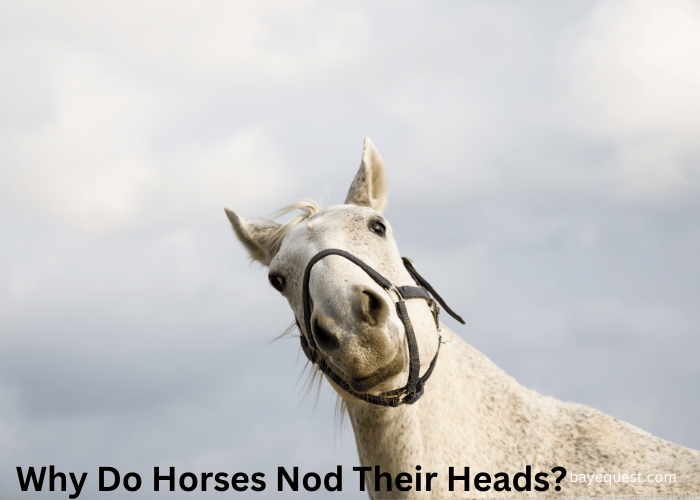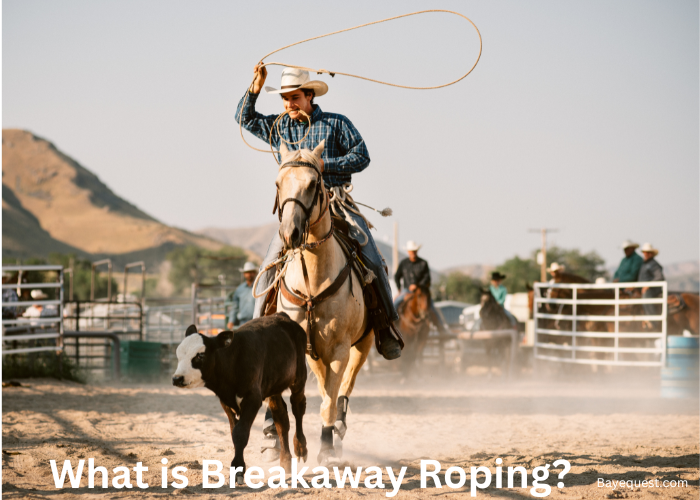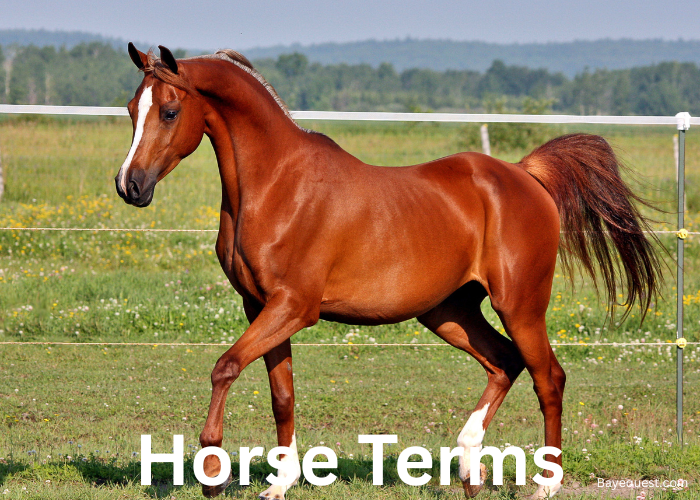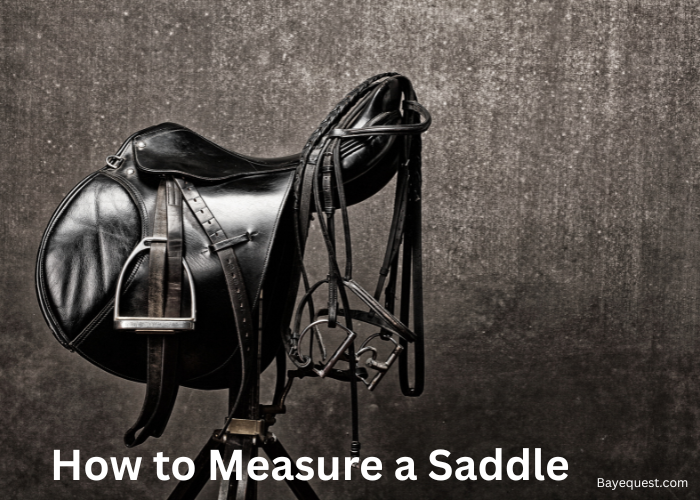You’ve probably seen horses nodding their heads, and it can be quite a sight. Some do it gently, like a slow dance, while others seem more excited, bobbing up and down like they’ve heard their favorite song.
But what’s behind all that head nodding? Is it a quirky habit or something more?
From expressing their mood to dealing with pesky insects, horses have their reasons. Let’s dive in and explore the fascinating world of horses and their head-nodding ways.
You might find there’s more to it than meets the eye.
Why Do Horses Nod Their Heads? Key Takeaway
Horses nod their heads for various reasons. To express excitement or discomfort, signal pain, seek treats, aid digestion, or respond to irritation from insects. This behavior can also indicate health issues like ear or dental problems, reflect learned behaviors, signify lameness or poor saddle fit, and release excess energy.
14 Reasons Why Horses Nod or Bob Their Heads
1. Expressing excitement
When horses nod their heads to express excitement, it’s like they’re shouting, “I’m thrilled!” This often happens during moments when they anticipate something enjoyable, like a ride or mealtime.
Their head nodding is a natural expression of joy and anticipation. You don’t need to discourage this behavior.
It’s a healthy display of their enthusiasm and a sign they are happy and engaged.
2. Signaling pain
Horses that nod because of pain display a different kind of behavior. This nodding might be more erratic or seem uncomfortable, and it’s often accompanied by other worrying signs, such as limping or refusing to eat.
If you see this, it’s a call for immediate attention. Carefully check for any signs of injury or illness, and consult a veterinarian if the cause isn’t obvious.
Addressing pain promptly is crucial for their health and well-being.
3. Seeking rewards
Nodding for rewards is another matter. Horses are smart; they quickly learn what behaviors earn them treats or attention.
If your horse starts nodding for a reward, they might exploit this behavior. To curb it, adjust your responses.
Offer treats or attention only when your horse is calm and not nodding. This teaches them that calm behavior, rather than nodding, is what earns them positive reinforcement.
4. Aiding digestion
Horses sometimes nod their heads during eating to aid digestion. This nodding helps them move the food along their esophagus, making it easier to swallow and digest.
It’s a natural and necessary behavior, especially when eating larger or coarser feeds. You shouldn’t try to stop this nodding, as it’s essential for their comfort and health while eating.
5. Expressing discomfort or annoyance
When horses are annoyed or uncomfortable, they might nod their heads too. This could be due to minor irritations like flies or a tack that doesn’t fit right.
Observing when and where this happens can help you identify and alleviate their discomfort. For instance, ensuring their bridle or halter fits properly or using fly repellent can reduce this behavior.
Always look to solve the underlying issue rather than merely stopping the nodding.
6. Stimulating endorphins
Nodding can also be a way for horses to stimulate endorphin release, especially when they’re bored or confined. Endorphins help them feel better, providing a sense of relief or pleasure.
If a horse nods frequently without an obvious reason, consider if they’re getting enough mental and physical stimulation.
Providing more exercise, interactive toys, or pasture time can help reduce this stress-related nodding by addressing their boredom.
7. Indicating ear infections
Horses nodding their heads can also indicate ear infections. There are several types of ear infections horses might experience:
Otitis externa. These involve the outer ear canal and are often caused by bacteria, fungi, or parasites. Signs include head shaking, ear sensitivity, and a noticeable discharge. Treatment involves cleaning the ear canal and applying topical medications prescribed by a veterinarian.
Otitis media. These are less common but more serious. They affect the horse’s balance and hearing. Symptoms might include abnormal head tilting or persistent nodding. Treatment often requires antibiotics and sometimes more aggressive interventions like draining fluid from the ear under veterinary supervision.
Otitis interna. These are rare and can impact the horse’s sense of balance, leading to severe coordination problems and possibly nodding or head shaking. Treatment can be complex, involving extended courses of antibiotics and sometimes surgical intervention, depending on the severity.
If you suspect your horse has an ear infection due to their head nodding, consult a veterinarian for a proper diagnosis and treatment plan.
8. Responding to dental issues
Horses nodding their heads might also be responding to dental issues. Given the nature of their diets and chewing motions, these are relatively common issues.
Here are some dental problems that could cause a horse to nod:
Sharp points and hooks. As horses chew, their teeth can develop sharp edges or hooks that can cause discomfort or injury to the mouth and gums. This can lead to head nodding as the horse tries to avoid the pain.
Tooth abscesses. These are infections at the tooth’s root or gums, which can be extremely painful. The discomfort might prompt a horse to nod or shake its head, especially when eating or when touched near the affected area.
Loose or broken teeth. These can result from trauma or wear and tear. A loose or broken tooth can cause significant pain, leading to head nodding as the horse attempts to manage the discomfort.
Malocclusions. Misalignment of the teeth can affect how a horse chews, leading to pain or discomfort that causes head nodding.
Wolf teeth issues. Wolf’s teeth are small, often sharp teeth that can interfere with the bit in a horse’s mouth, causing discomfort, especially when being ridden, which might result in head nodding.
To address these issues, consider regular dental check-ups. Equine veterinarians or equine dental specialists can perform examinations and offer treatments.
Early detection and treatment of dental problems can help prevent more severe issues and the associated head nodding.
9. Reacting to insects
Head nodding in horses can often be a reaction to insects, especially flies bothering their face or ears. This action helps to shoo away pests and can be frequent during warmer months when insect activity is high.
Horse owners can mitigate this by wearing fly masks or insect repellents. The stable should also be kept clean to reduce insect presence.
10. Manifesting learned behaviors or vacuum activities
Sometimes, horses develop a habit of nodding their heads as a learned behavior or a vacuum activity. This is repetitive behavior performed in the absence of a usual stimulus.
This can occur in horses that are confined or lack mental stimulation. Providing enrichment through toys, more social interaction, or varied exercise to reduce nodding.
11. Lameness indication
Nodding while walking can signify lameness, particularly if the horse nods its head downward with each step of the lame leg. This is a compensatory movement to alleviate pain.
Let a vet evaluate it to diagnose and treat the underlying cause of lameness.
12. Improper saddle fit
A poorly fitting saddle can cause discomfort or pain, leading horses to nod their heads, especially when being ridden. This nod is a sign of trying to escape the discomfort.
Always check the saddle fit regularly, and adjust or replace saddles as needed to ensure comfort and prevent pain-related behavioral issues.
Find out how to fit a saddle properly to ensure your horse is comfortable and performs at its best.
13. Releasing excess energy
Energetic horses often nod their heads more if they aren’t getting enough exercise. This head-nodding helps them let out built-up energy.
To handle this, you should increase their exercise time, let them out for longer periods, and engage them in activities that make them think.
This combination can keep their energy in check and reduce head nodding. Make sure their daily routine includes plenty of physical and mental stimulation.
This approach keeps horses not only physically fit but also mentally sharp. It’s a great way to ensure your horse stays happy and behaves well.
14. Discomfort due to the bit
Head nodding can also indicate discomfort caused by the bit, particularly if it does not fit correctly or if the horse is sensitive to the type of bit used. Choose the right bit for your horse’s mouth structure and training needs, and ensure it’s fitted correctly.
Also, regularly check and adjust the bit. Training sessions to accustom the horse to the bit can also help alleviate discomfort and reduce head nodding.
15. Reacting to environmental changes
Horses are highly sensitive to their surroundings. Sudden changes in their environment, such as new noises or unfamiliar objects, can cause them to nod their heads as a way to process or react to these stimuli.
16. Displaying anxiety in new situations
In unfamiliar settings, such as a new stable or during transport, horses may nod their heads as a sign of anxiety or stress. This behavior often subsides once they feel secure and adjusted to the new environment.
Why Head Tossing Presents a Problem for Riders
Head tossing can be a big problem for riders. It’s not just about discomfort; it can signal something wrong.
When a horse tosses its head, it’s hard for the rider to communicate clearly through the reins. This can lead to misunderstandings between the horse and rider, making riding less safe and enjoyable.
Also, head tossing might mean the horse is in pain or irritated. It could be from dental issues, a poor-fitting saddle, or something else uncomfortable.
If a horse keeps tossing its head, check for problems and fix them. This helps ensure that both the horse and rider are safe and can enjoy their ride.
How to Prevent Excessive Head Nodding
To prevent excessive head nodding in horses, start by figuring out why it’s happening. Check if your horse is in any pain. Look at their teeth, their ears, and the fit of their saddle. If something’s not right, get it fixed.
Make sure your horse gets enough exercise, too. A horse that’s full of energy might nod more if it’s not getting enough time to run and play. Mix up their routine with different kinds of training and some fun activities.
Keep an eye on their diet and health as well. Sometimes, changes in what they eat or how they feel can lead to more nodding.
By staying on top of these areas, you can help keep your horse calm and their head nodding under control.
How to Eliminate Head Nodding
To eliminate excessive head nodding in horses, you need to pinpoint and address the underlying causes. Here are several strategies to consider:
Health evaluation. First, rule out any health issues. Have your horse examined by a veterinarian to check for medical conditions that could be causing discomfort.
Proper tack fit. Ensure that all tack, especially the saddle and bridle, fits properly. An ill-fitting saddle or an uncomfortable bit can cause a horse to nod excessively.
Adequate exercise. Provide sufficient physical activity. Horses that are not adequately exercised may exhibit head nodding to release pent-up energy. Increase their turnout time and incorporate a variety of exercises into their routine.
Behavioral training. If head nodding is a learned behavior or a response to certain stimuli, work with a trainer to apply consistent and positive reinforcement training techniques. This can help modify unwanted behaviors effectively.
Environmental management. Improve the horse’s living environment to reduce stress and boredom. This includes enhancing social interactions with other horses, offering enrichment toys, and ensuring a comfortable stall. (Read also: Horse boredom busters.)
Dietary review. Sometimes, dietary imbalances or deficiencies can contribute to behavioral issues like head nodding. Review your horse’s diet with a nutritionist and make adjustments to ensure it’s balanced and fulfills all its nutritional needs.
Why Do Horses Nod Their Heads When They Eat?
Horses nod their heads when they eat primarily to aid in the mechanics of chewing and swallowing. This natural motion is part of how they process their food effectively.
Here’s a breakdown of why this occurs:
Chewing efficiency. As horses chew, they often move their heads to help grind the food between their molars. This head nodding action can enhance the effectiveness of their chewing, making it easier to break down tougher feed.
Facilitating swallowing. The nodding motion helps horses maneuver the chewed food back into their throats. Since horses have a long esophagus and rely on gravity to help move food to their stomach, nodding their heads can assist in guiding the food down.
Natural rhythm. Head nodding while eating can also be part of a horse’s natural rhythm and comfort while feeding. It’s a relaxed and rhythmic motion that aligns with their natural eating habits observed in the wild.
Why Do Horses Nod Their Heads When Standing?
When horses nod their heads while standing, it can be due to various reasons. These may range from simple relaxation to signaling discomfort or needs.
Here’s a deeper look into why this behavior occurs:
Relaxation and drowsiness. Just like people may nod off when they’re sleepy, horses, too can nod their heads as they doze off while standing. This is often seen in horses that are comfortable and secure in their environment. Their head nodding can indicate that they are slipping in and out of light sleep phases.
Seeking attention or expressing needs. Horses are intelligent and communicative creatures. A horse might nod its head to draw attention to itself, possibly indicating a desire for interaction, food, or water. Head nodding can be a way to communicate these needs to their caretakers or other horses.
Response to discomfort or pain. If a horse is experiencing discomfort, such as a fly bite or something more internal, like pain, it may nod its head as a reaction. Observing additional body language cues can help determine if the nodding is due to discomfort.
Behavioral habit. In some cases, head nodding can become a habitual behavior for horses.
Why Do Horses Nod Their Heads When Walking?
Horses often nod their heads while walking for various reasons. It could be a way to maintain their balance or rhythm, especially when navigating uneven terrain.
Sometimes, it’s a natural part of their movement, like a gentle bob with each step. Other times, it might indicate discomfort or pain.
Always pay attention to their body language and behavior to help determine the cause of their head nodding while walking.
Why Do Horses Shake Their Heads While Resting?
When horses shake their heads while resting, it’s often a sign of relaxation and comfort. This is similar to humans adjusting their posture or shifting position for comfort while resting.
Horses may shake their heads to find a more comfortable position for their necks or to relieve tension. This natural behavior indicates that they are at ease and enjoying their downtime.
Read also: Why do horses eat poop?
Why Do Horses Bob Their Heads? Conclusion
So, there you have it— the fascinating world of why horses nod their heads. From expressing excitement to signaling discomfort, each nod tells a unique story about horses.
Understanding the reasons behind their nods can deepen our connection with them and ensure their well-being. So, the next time you see a horse nodding its head, remember it’s more than just a simple gesture. It’s a window into their world.
Keep observing, keep learning, and keep cherishing the incredible bond we share with these magnificent animals.








